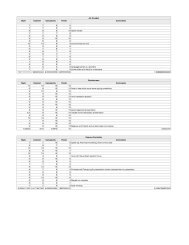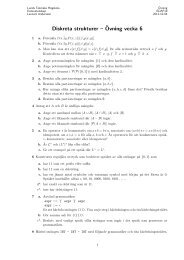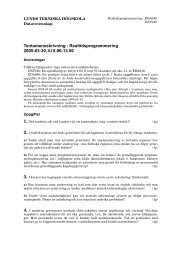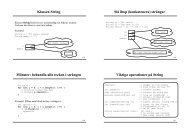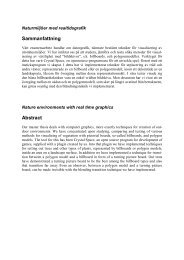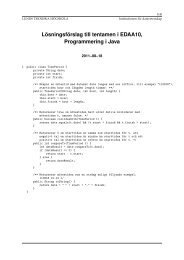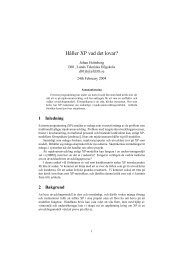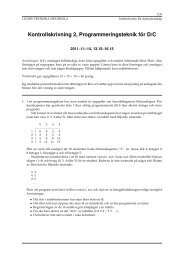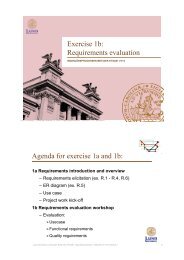JAVA-BASED REAL-TIME PROGRAMMING
JAVA-BASED REAL-TIME PROGRAMMING
JAVA-BASED REAL-TIME PROGRAMMING
Create successful ePaper yourself
Turn your PDF publications into a flip-book with our unique Google optimized e-Paper software.
3. Multi-Threaded Programming<br />
break the rules. Before doing that, be aware of the previos section and the<br />
following:<br />
1. As a way of doing manual performance optimization, small get and set<br />
methods (belonging to a monitor with other methods synchronized) are<br />
often not declared synchronized. However, the way it is done is (as<br />
far as the author has seen) mostly wrong, resulting in very-hard-to-find<br />
bugs when the program is run on some platforms. Therefore, keep the<br />
following in mind:<br />
• Only access data that is consistent all the time. Even if getting<br />
an integer can be done atomically, that attribute may have an inconsistent<br />
value due to computations in the synchronized methods.<br />
In a non-final class with non-private attributes, you cannot know<br />
what subclasses will do.<br />
• Only access a single single-word value (built in type or object reference)<br />
by a non-synchronized monitor method, and if not declared<br />
volatile, make sure that the updated value is obtained (by other<br />
system calls resulting in memory being updated, or by only permitting<br />
a single-threaded write during startup or similar). Even if<br />
you figure out that several attributes can be changed due do the<br />
logic of other methods, the risk is too high that errors are introduced,<br />
for instance when the class is extended or enhanced. An<br />
acceptable single-word access could be an object reference that is<br />
final (set in constructor) but needs to be frequently obtained by<br />
other threads.<br />
• Attributes (except those of types double or long that need synchronization<br />
to be portable in any case) accessed without synchronization<br />
should be declared volatile. According to the Java language<br />
specification, all types except long and double are atomically accessed.<br />
For object references it is of course crucial that the address<br />
value does not get corrupted, which would break the built-in safety<br />
(the so called sandbox model) of Java. The only data-type you can<br />
assume being atomically accessed in native code on all platforms<br />
is the byte, so implementation of native methods (and virtual machines<br />
and Java native compilers) requires some care, in particular<br />
for CPUs with word length less than 32 bits.<br />
• Comment your assumptions and decisions when you are doing this<br />
type of (what you think is) clever programming.<br />
Hence, be careful when skipping synchronization; such optimization is<br />
better done by compilers and class loaders.<br />
2. When developing software libraries or components that should stand<br />
also improper usage, such as a synchronized block locking a monitor<br />
72 2012-08-29 16:05





